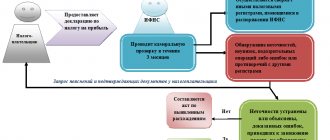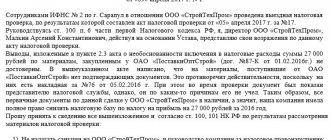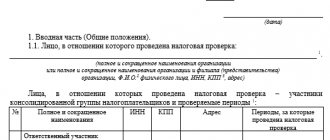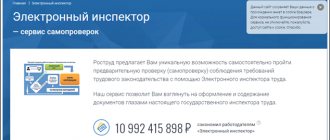Last time we told you when an employer may face an inspection by the State Labor Inspectorate (SIT). From this article you will learn how such checks are carried out taking into account the changes that came into force on July 1, 2022, and how to prepare for them. The most detailed guide to GIT checks on Clerk!
How will you find out about the verification?
of a scheduled inspection at least 3 working days in advance by registered mail or electronic document signed with an electronic signature.
about unscheduled inspection in any way no later than 24 hours before the start in the following cases:
- the inspection is carried out at the request of the employee;
- you have already had an inspection, as a result of which you were given an order to eliminate the violations, but you did not eliminate them and the State Tax Inspectorate ordered a repeat inspection.
In other cases, you will not be notified in advance about an unscheduled inspection, that is, it will be sudden.
Scheduled and unscheduled inspections can be documentary - at the location of the inspection, or on-site - on the territory of the employer.
What will they check?
Unscheduled inspection. It is usually carried out on a specific topic, for example, studying the timeliness of payment of wages. In this case, inspectors will be able to request from you only those documents that relate to this topic. They have no right to go beyond the topic. If the topic of the audit is compliance with labor laws, then you will have to provide almost all the documents on personnel records and settlements with personnel.
Scheduled check . It is carried out according to checklists. This is a compliance checklist. The notice of the upcoming inspection will list checklists that you will need to fill out. Usually they check the procedure for hiring and dismissal, concluding, amending and terminating employment contracts; observance of the right to leave, wages, working hours, how the labor protection service functions.
You can assess the state of your personnel records in advance and look at it through the eyes of an inspector using the “Electronic Inspector” service on the Rostrud website.
The list of documents that a labor inspector may request is limited.
So, you may be asked:
- collective agreement;
- internal labor regulations;
- wage regulations;
- staffing schedule;
- statements and notifications to employees;
- orders;
- labor and civil contracts;
- job descriptions, work books or information about work activities;
- personal cards;
- agreements on full financial liability;
- time sheet, vacation schedule;
- agreement on dividing annual leave into parts;
- settlement note upon termination of an employment contract;
- payroll and payslips;
- payment orders for the transfer of wages and other payments to employees;
- payslips;
- documents on labor protection, personal data protection, etc.
Most of these documents are drawn up in a unified form; the forms are available on the Rostrud website. If you have difficulties at work, use the reminders to solve the most common work situations.
Fines from the labor inspectorate
If the labor inspector reveals violations, then first of all the employer will be given an order. Failure to eliminate all points of the order may result in suspension of activities or a fine.
Depending on the violation, a fine may be imposed on the company itself, its director, individual entrepreneur, or responsible persons (this may be the head of the personnel department or the chief accountant), if this is provided for by the company’s rules.
The most common fines issued by the labor inspectorate in 2022:
| Violation | Fine for an official | Fine for individual entrepreneurs | Fine for a legal entity | |
| Violation of labor laws | 1,000 - 5,000 rubles | 30,000 - 50,000 rubles | ||
| Repeated violation of labor laws | 10,000 - 20,000 rubles or disqualification for up to three years | 5,000 - 10,000 rubles | 50,000 - 100,000 rubles | |
| Admission to work of an employee who does not have the right to do so (for example, without a health certificate), while the employee denies this. | 10,000 - 20,000 rubles for the employer and 3,000 - 5,000 for the employee | |||
| Evasion of concluding an employment contract with an employee or its incorrect execution | 10,000 - 20,000 rubles | 5,000 - 10,000 rubles | 50,000 - 100,000 rubles | |
| Repeated evasion of concluding an employment contract, deliberately incorrect execution of it, or re-admission to work of an employee who does not have the right to do so | Disqualification for up to three years | 30,000 - 40,000 rubles | 100,000 - 200,000 rubles | |
| Violation of labor protection requirements | 2,000 - 5,000 rubles | 50,000 - 80,000 rubles | ||
| Repeated violation of labor protection | 30,000 - 40,000 rubles or disqualification for up to three years | 100,000 - 200,000 rubles or termination of activity for up to three months | ||
| Violation of special inspection requirements | 5,000 - 10,000 rubles | 60,000 - 80,000 rubles | ||
| Permission to work for an employee who has not undergone labor safety training | 15,000 - 25,000 rubles | 60,000 - 80,000 rubles | ||
| Failure to provide employees with personal protective equipment (when required) | 25,000 - 30,000 rubles | 130,000 - 150,000 rubles | ||
For what period can documents be requested and fined?
The period is not limited, but repeated inspections are not carried out for the same circumstances. That is, during a scheduled inspection, they cannot ask you for documents for the period that has already been inspected.
You may not submit documents for inspection that have expired. However, salary and personnel documents are usually stored for a long time. Determine storage periods in accordance with the List approved by Order No. 236 dated December 20, 2019.
The statute of limitations for administrative violations is limited to one year from the date of commission. If such a violation is found after a year has passed, they will no longer be able to punish them. Therefore, before checking, pay special attention to the preparation of documents for the last year.
Example 1.
The waybill dated June 30, 2020 does not contain a note about the pre-trip inspection of the driver. That is, he could board the flight drunk or with high blood pressure, which would create the risk of an accident during the flight. The labor inspectorate discovered this violation during an inspection on July 31, 2021, that is, when more than 1 year had passed from the date it was committed. They will no longer be able to punish the employer for this.
But this does not apply to all situations. There are ongoing violations , for which the statute of limitations is counted from the date on which they were discovered. For example, the lack of internal labor regulations or a registration log (instructions, work books, etc.).
Example 2.
On July 31, 2022, inspectors discovered that the driver was hired on May 15, 2022, without a mandatory medical examination. This means that all this time the work was performed by a person who could have limitations incompatible with this profession. This is already an ongoing violation, and despite the fact that more than a year has passed since the person was hired, they can be fined for this for another year after inspectors discovered it.
Therefore, you may be fined for ongoing violations even after several years.
It is impossible to say exactly which violations are considered ongoing, because there are no clear criteria and lists. Therefore, the State Tax Inspectorate often interprets it in its favor and fines it, while employers have to go to court and rely on established practice.
An example from judicial practice
During the inspection, inspectors decided that incorrectly drawn up employment contracts were a continuing violation. But the judges decided that the violation occurred on the day the employment contract was drawn up, and since this was more than a year ago, then the employer cannot be fined (Resolution of the Supreme Court of the Russian Federation dated November 1, 2018 No. 3-AD18-7).
The Supreme Arbitration Court announced the following criteria: a continuing administrative offense (action or inaction) that is expressed in long-term continuous failure or improper fulfillment of duties provided for by law.
Results
Of course, it is not always possible to prepare for a labor inspection inspection. After all, inspectors are not even required to notify the employer in advance about some inspections (for example, based on employee complaints). It is recommended to keep personnel documents in order and periodically conduct self-checks using checklists.
Sources:
- Labor Code of the Russian Federation
- Law “On the Protection of Rights...” dated December 26, 2008 No. 294-FZ
- Decree of the Government of the Russian Federation dated July 16, 2009 No. 584
- order of Rosarkhiv dated December 20, 2019 No. 236
You can find more complete information on the topic in ConsultantPlus. Free trial access to the system for 2 days.
What to pay attention to before checking
Special assessment of working conditions (SOUT)
It must be carried out by all employers, including individual entrepreneurs, for all employees, except for homeworkers and remote workers.
Send the SOUT results to the labor inspectorate and post them on your website. Familiarize each employee with a workplace certification card against signature, including when hiring. Specify the class of working conditions determined based on the results of the special labor assessment in the employment contract.
Occupational Safety and Health
Assign responsibility for labor protection to one of the organization's employees. If there are more than 50 people on staff, enter the position of occupational safety specialist or occupational safety service. In this case, responsible persons must have the necessary education.
Send at least three specialists to an accredited organization to test their knowledge of labor protection, then form a commission from them that will train and test the rest of the employees. If it is not possible to create an internal commission, then subsequent training for the remaining employees will have to be carried out in an accredited organization. When hiring any employee, regardless of his profession, conduct a briefing on labor protection and make an entry with the employee’s signature in the introductory briefing log.
In 2022, new labor protection rules came into force. In this regard, conduct an extraordinary test of knowledge of new regulations. Document the training in a protocol, and enter information about the re-inspection into the employees’ certificates.
Employment contract
Obtain the employee’s signature on your copy of the employment contract indicating that he was given a copy. Make sure that the contract contains the required information: last name, first name, patronymic and passport details of the employee, name, TIN of the employer, last name, first name, patronymic, position of the employer’s representative and the basis of his authority. Indicate the place and date of conclusion of the employment contract.
Include the mandatory conditions in the contract: place of work, job function, start date of work, payment terms, work and rest schedule, working conditions in the workplace based on the SOUT, guarantees and compensation, the condition of compulsory social insurance of the employee.
All changes to the mandatory terms of the employment contract must be formalized in an additional agreement to the contract.
Civil contract
Make sure that the GPC agreements do not contain any signs of employment contracts. If it says that the work is carried out according to the operating mode of the organization, instead of the measured volume of work, the labor function is described, the same work is performed month after month, the terms of payment under the contract coincide with payments to full-time employees - the contract can be reclassified as an employment contract.
Recruitment
Obtain the employee's signature on the acceptance order. If the employment contract is fixed-term, indicate the expiration date in the order. Familiarize the employee with the collective agreement (if any), internal labor regulations, job descriptions and other local regulations against signature. Receive an application on the method of salary payment with bank details, an application to join a corporate banking product. Familiarize yourself with the SOUT map. Conduct initial training on labor protection.
Dismissal
Obtain the employee's signature on the dismissal order. Make sure that the resignation letter is dated 14 days before the dismissal order is issued. Calculate compensation for unused vacation and wages for hours worked, pay them on the day of dismissal. Issue a work record book on the day of dismissal, get the employee’s signature in the work record book.
Annual paid vacation
Two weeks before the start of the calendar year, approve the vacation schedule and familiarize employees with it against signature. Set at least one part of your vacation to be at least 14 days long. Notify the employee two weeks in advance, against signature, of the upcoming vacation.
Calculate vacation pay based on average earnings, taking into account indexation if there was an increase in wages. Pay for your vacation no later than 3 days before it starts. Obtain the employee's written consent to postpone the vacation to another time. Make sure that there are no employees who have not taken a vacation for two years in a row.
Pay slips
Approve the form of the pay slip by order. Give slips to employees in printed or electronic form, confirm their receipt with the employee’s signature in the issue register or in another way.
Wage
Pay your salary at least every six months. The specific date of payment is established by internal labor regulations, collective or labor agreement. The date must not be later than 15 calendar days from the end of the period for which the salary was accrued.
Do not set wages below the minimum wage. Regions have the right to set their own minimum wage, which may be higher, but cannot be lower than the federal one. In such cases, the employer is obliged to pay employees no less than the regional minimum wage. Find out what minimum wage is in effect in your region.
Set in the wage regulations the period and frequency of wage indexation. It is advisable to conduct it at least once a year in January and index it no less than the officially published inflation percentage. Conduct such indexing in a timely manner.
On-site inspections of the State Tax Inspectorate: how can an employer prepare? Rights of employers during inspections
T. N. Malitskaya author of the article, specialist in accounting and taxation, HR issues, payroll taxation, application of labor legislation, head of the Ascon CSC
Every year, Rostrud draws up a plan identifying employers who will be inspected next year. This plan is consistent with the prosecutor's office and is freely available. In order to check whether your organization is included in the inspection plan, you need to visit the labor inspectorate website https://git78.rostrud.ru/plan/ or the prosecutor’s office website https://procspb.ru/plan-proverok. The information posted on these sites will, among other things, indicate the month of the inspection, the grounds for its conduct, the type of inspection (B - on-site or D - documentary), as well as the name of the state control (supervision) body with which this inspection will be carried out jointly . The approved plan is not adjusted during the year.
It would be a good idea to look at this plan before the vacation schedule for the next year is approved, so that key employees do not end up on vacation during the check month indicated in the schedule. And if you have already approved the schedule, then, if necessary, it will have to be adjusted. An extract from the 2016 inspection plan is shown in Table 1.
In addition, if in the inspection plan you see an unauthorized basis for its conduct (for example, 3 years have not passed since the date of state registration of the legal entity), then you should write a letter about this to the state labor inspectorate, attach copies of supporting documents, and then the inspection will not take place. As practice shows, about 10% of companies included in the inspection plan end up in it without legal grounds.
Table 1
Plan for conducting routine inspections of legal entities and individual entrepreneurs for 2016 (extract)
The nature, types, grounds, timing and purposes of inspections are given in Table 2.
table 2
GIT inspections: types, grounds, timing
| Nature of checks | ||
| Planned | Unscheduled | |
| Subject of inspection |
| |
| Reasons for carrying out | Carried out after three years from the date: 1) state registration of a legal entity; 2) completion of the last scheduled inspection of the legal entity; 3) the start of business activities by a legal entity. | 1) Expiration of the deadline for the organization to comply with a previously issued order to eliminate violations; 2) receipt by the labor inspectorate of appeals and statements about violations by employers of the requirements of labor legislation and other regulatory legal acts, including labor protection requirements, which resulted in a threat of harm to the life and health of workers; - if the federal labor inspectorate received: a) an employee’s appeal or statement about the employer’s violation of labor rights; b) an employee’s request to conduct an inspection of labor conditions and safety at his workplace (Article 219 of the Labor Code of the Russian Federation); — publication by the head of the labor inspection of an order (instruction) on instructions from the President of the Russian Federation, the Government of the Russian Federation, or on the basis of the prosecutor’s request to conduct such an inspection as part of supervision over the implementation of laws on materials and appeals received by the prosecutor’s office. |
| notice period | No later than 3 working days before the start by any available method. | No later than 24 hours before it starts by any available means. In cases where notification of an inspection may harm its effectiveness and will conceal the fact of a violation, notification of the employer about the upcoming inspection is not permitted. |
| The notification received from the State Tax Inspectorate should be registered in the registration journal for incoming correspondence in order to record the period of notification. | ||
| Dates | The general rule is that the inspection period should not exceed 20 working days. For small businesses, the period for conducting a scheduled inspection is:
When conducting an unscheduled on-site inspection, as well as a documentary inspection of small businesses, the generally established rule is applied - 20 working days. If necessary, the labor inspectorate may extend the inspection period, but by no more than 20 working days, and in relation to small enterprises and micro-enterprises - by no more than 15 hours. If the labor inspectorate has decided to extend the inspection period, it must be brought to the attention of the employer at least 3 working days before the end of the main inspection period. For a legal entity that operates in the territories of several constituent entities of the Russian Federation simultaneously, inspection deadlines are set separately for each branch, separate division, or representative office, but the total period cannot exceed sixty working days. Extension of the period for unscheduled and documentary inspections is not allowed. | |
| Types of checks | ||
| Visiting | Documentary | |
| Location | On the employer's premises. | On the territory of the inspection authority. |
| Pros and cons of types of checks | pros – there is no need to copy, certify, staple and submit a large number of documents for verification. Minuses – inspectors can request any document. Inspectors can also check the premises occupied by the company and ask questions to the staff. | pros – documents for verification are requested in advance, it is possible to prepare them. If the documents provided to the regulatory authority are not sufficient to conduct a full inspection, then a request for additional information may be sent to the employer. The employer is obliged to provide the documents or other information specified in the request within ten working days. Minuses – with a large document flow, you will have to prepare a large number of documents, draw up inventories and transfer documents according to the act. |
The Government of Russia submitted bill No. 983383-6 [15] to the State Duma, which proposes to establish special fines for late payment of wages, increase the percentages provided for in Article 236 of the Labor Code, increase the period for workers to go to court, and allow State Labor Inspectors to carry out unscheduled inspections without coordination with the prosecutor's office.
The draft assumes that in case of late payment of wages
or setting wages below
the minimum wage
, GIT inspectors will have the right to conduct an unscheduled inspection of the employer. Now, to conduct such an inspection, the presence of complaints and the consent of the prosecutor's office are required.
The author of the bill is the Government of Russia, so the likelihood that the State Duma will consider and adopt this bill in the near future is very high. Thus, in the near future, the number of unscheduled inspections may increase significantly.
According to information posted on the website of the labor inspectorate for St. Petersburg, in 2015, 7,153 inspections were carried out, of which only 1,170 were on-site inspections, the remaining 5,983 were documentary (see diagram 1).
Diagram 1
Based on the inspections carried out in 2015, it can be concluded that in 78% of cases of inspections of the State Inspectorate for Civil Inspections, the basis for the inspections were citizens’ appeals and only 16% were scheduled inspections (see Diagram 2).
Diagram 2
Based on the weekly reports posted on the website of the labor inspectorate for St. Petersburg for 2016, the following conclusions can be drawn:
1) in 85 cases out of 100, inspections end in identifying violations;
2) of the identified violations, more than half relate to labor protection at the enterprise;
3) the average administrative fine is 50,000 rubles.
Employer's rights during an on-site inspection
At the request of the employer, inspectors are required to present official identification.
Before starting the inspection, the head of the organization (representative) must receive a copy of the order (order) of the head of the State Inspectorate against signature; the persons conducting the inspection must provide it.
The employer has the right to request from officials all information about the body that sent them to conduct the inspection, as well as about the experts and expert organizations participating in it, Part 3 of Art. 14 [2].
The head of the organization being inspected or his authorized person has the right to be present during the inspection, as well as to give appropriate explanations to paragraph 1 of Art. 21 [2], para. 2 clause 8 [3] and inspectors have no right to interfere with this.
The employer has the right to become familiar with all administrative regulations for control measures and the procedure for their implementation at those facilities that the legal entity uses in conducting its activities.
If the head of the organization (authorized representative) is absent during the inspection, an on-site inspection (scheduled, unscheduled) cannot be carried out. The exception is cases when an inspection is carried out on such grounds as: causing harm to the life or health of citizens, harm to animals, plants, the environment, or cultural heritage sites.
At the end of the inspection, the inspector must draw up a report in which the manager (authorized person) puts his signature, thereby confirming that he is familiar with the results of the activities carried out in Part 1 of Art. 16 [2], para. 1 clause 61 [3].
If the employer does not agree with the conclusions or facts set out in the report based on the results of the inspection (or in the order to eliminate the identified violations), he can submit his objections in writing. Objections are submitted to the body that carried out the control measures within 15 days from the date of receipt of the inspection report, part 12, article 16 [2], para. 1 clause 63 [3].
If the organization has documents that can confirm the validity of the objections, then certified copies of such documents are attached to the act.
The employer has the right to appeal administratively or judicially against the actions (inactions) of officials of the body conducting the inspection, as a result of which his rights were violated, Art. 254 Code of Civil Procedure of the Russian Federation [10].
If an administrative penalty was applied to an employer based on the results of an inspection, it can also be challenged. To do this, you should provide documents, evidence or other arguments that can confirm that you are right.
The employer also has the right to file a claim in court to recover damages or lost profits that were caused by the actions (inaction) of officials of the state control body, and which were declared unlawful by Art. 22 [2].
Employer's responsibilities during an on-site inspection
The employer is obliged to provide documents for verification only if a documentary check of Part 5 of Art. 12 [2], para. 7 clause 8 [3].
If original documents are transferred, it is best to formalize such transfer in writing. This can be done in the form of a transfer and acceptance certificate or an inventory.
When preparing documents, the employer must be guided by the procedure for transferring personal data of employees, which is provided for in Art. 88 Labor Code of the Russian Federation [1]. Namely: the act must indicate that the transmitted data can only be used for control procedures.
The head of the organization being inspected is obliged to be personally present during the inspection, or to ensure the presence of authorized representatives who are responsible for organizing and conducting activities to fulfill all mandatory requirements in the field of labor and its protection, Part 1 of Art. 25 [2], para. 9 clause 8 [3].
In addition, the employer is obliged to ensure unimpeded access for inspectors to the territory of the organization, as well as to buildings, structures, and premises that are used by the organization in carrying out its business activities, as well as to equipment and transport.
Registration of inspection results
At the end of the inspection, the inspector must draw up a report in two copies, the standard form of the report is approved by Order of the Ministry of Economic Development of Russia dated April 30, 2009 N 141 [9].
One copy is handed over to the head (authorized person) of the organization being inspected against signature. If the manager refuses to sign, a corresponding entry is made on the act.
All legal entities and entrepreneurs must keep a log of inspections in accordance with Part 8 of Art. 16 [2] and, in turn, the employer has the right to require inspectors to make an entry in such a journal.
If violations are identified based on the results of the inspection, state labor inspectors, simultaneously with the act, have the right to present employers or their representatives with an order to eliminate violations of labor legislation, Part 3 of Art. 16 [2], para. 4 paragraph 60 [3].
The instructions presented are mandatory for the execution of Art. 357 of the Labor Code of the Russian Federation [1].
The period for appealing an order must not exceed:
- 15 days if the appeal is made to a superior manager or the Chief State Labor Inspector of the Russian Federation, clause 12 of Art. 16 [2].
- 10 days when appealing to the court, Part 2 of Art. 357 of the Labor Code of the Russian Federation [1].
The appeal period begins to count from the date the employer receives the order attached to the inspection report.
If during the inspection violations of labor legislation and the deadlines for bringing to responsibility, which are established by Art. 4.5 of the Code of Administrative Offenses of the Russian Federation [12], have not yet expired, the inspector, in addition to the act, draws up a protocol on the administrative offense, paragraph. 6 clause 60 of the Regulations [3], clause 1 art. 28.5 Code of Administrative Offenses of the Russian Federation [12].
It may happen that during the inspection there will be gross violations of the established requirements for organizing and conducting inspections, then, according to Part 1 of Art. 20 [2], its results cannot be evidence of violation by the employer of mandatory requirements and requirements provided for by municipal legal acts. The results of such inspections are subject to cancellation by a higher state control (supervision) body or a court based on an application from the employer.
Gross violations during inspections are (Part 2 of Article 20 [2]):
- lack of grounds for conducting a scheduled inspection;
- failure to comply with deadlines for notification of inspections;
- failure to comply with scheduled inspection deadlines;
- involvement in the implementation of control measures of legal entities and individual entrepreneurs not accredited in the established manner, as well as citizens who have not passed certification;
- lack of grounds for conducting an unscheduled on-site inspection;
- failure to agree with the prosecutor's office on an unscheduled on-site inspection of a legal entity or individual entrepreneur;
- violation of the terms and time of scheduled on-site inspections in relation to small businesses;
- carrying out an inspection without a directive or order from the head (deputy) of a state or municipal control body;
- requesting documents not related to the subject of the inspection;
- exceeding the established deadlines for the inspection;
- failure to submit an inspection report;
- carrying out a routine inspection not included in the annual plan;
- conducting an on-site inspection with the participation of experts and expert organizations that have civil and labor relations with legal entities and individual entrepreneurs in respect of whom the inspection is being carried out.
Depth of inspection
Article 357 of the Labor Code of the Russian Federation [1] states that when conducting inspections, state labor inspectors have the right to request from employers and receive from them free of charge documents, explanations, and information necessary to perform control functions. However, the law does not limit controllers regarding the period for inspection coverage. However, the employer is not required to submit documents whose retention period has expired.
All personnel documents must be stored in the organization in accordance with the established retention periods. There is a List regulating the storage periods for personnel documents, it was approved by order of the Ministry of Culture of Russia dated August 25, 2010 N 558 [16]. All organizations, regardless of their form of ownership, must comply with the deadlines specified in the List.
Please note Federal Law No. 43-FZ dated March 2, 2016 [17], according to which documents on personnel created after 2003 must be stored for 50 years. For documents on personnel that relate to civil service (except for state civil service), this law provides for special rules.
What documents do inspectors request?
To date, there is no legally established single list of documents that every organization should have available. An analysis of various regulations shows that organizations must formulate separate local regulations, maintain certain journals, issue orders and other documents, and also comply with their storage periods. Each organization can create its own list of documents that should be in this particular company. In such a list it is necessary to indicate not only the names of documents, but also the reasons for their maintenance, as well as document logs.
An approximate list of documents that the labor inspectorate may require during an inspection is given in Table 3.
Table 3
| Item no. | Title of the document |
| 1 | Employment contracts and additional agreements thereto |
| 2 | Agreements on full individual financial liability and agreements on full collective (team) financial liability |
| 3 | Student contracts |
| 4 | Work records |
| 5 | Movement accounting book and receipt and expenditure book for accounting of work books and inserts for them |
| 6 | Personal cards of employees |
| 7 | Staffing table |
| 8 | Vacation schedule and notice of the start of vacation |
| 9 | Time sheet |
| 10 | Pay slips and order to approve the pay slip form |
| 11 | Local acts. Mandatory local acts include internal labor regulations, regulations on wages and bonuses, regulations on personal data of employees (Article 87 of the Labor Code of the Russian Federation) and instructions on labor protection (Article 212 of the Labor Code of the Russian Federation) |
| 12 | Occupational safety documents |
| 13 | Orders (instructions) of the employer |
| 14 | Military registration documents for citizens |
| 15 | Regulations on the branch, representative office |
| 16 | Regulations on certification |
| 17 | Regulations on the protection of trade secrets |
| 18 | Shift schedule |
| 19 | Results of medical examinations of employees, if necessary (Article 212 of the Labor Code of the Russian Federation) |
| 20 | Other documents (must be available only in cases where any actions of the employer depend on the will of the employee or are provided for by the legislation of the Russian Federation) |
Labor inspectors have the right to supervise and control the implementation of workers' rights to receive coverage for compulsory social insurance against accidents at work and occupational diseases, as well as the appointment, calculation and payment of temporary disability benefits at the expense of employers (Article 356 of the Labor Code of the Russian Federation [1]). In addition to documents confirming the payment of benefits, labor inspectors can check the availability of a first aid kit, since Article 223 of the Labor Code of the Russian Federation [1] obliges employers to create sanitary posts with first aid kits. All organizations are required to have a first aid kit, regardless of whether their activities are industrial or not. Inspectors can check not only the presence of a first aid kit in the organization, but also its contents.
Statute of limitations for prosecution and amounts of fines for violation of labor laws
When touching on the topic of inspections, it is impossible to ignore information about the statute of limitations for holding people accountable for violations of labor laws. After this period, the employer cannot be held liable for the offense committed, regardless of whether he was guilty of the offense.
A decision in a case of an administrative offense cannot be made after 1 year from the date of commission of the administrative offense, Art. 4.5 Code of Administrative Offenses of the Russian Federation [12].
If the statute of limitations for bringing to justice has expired, the case of an administrative offense must be terminated, paragraph 1 of Art. 24.5 Code of Administrative Offenses of the Russian Federation [12].
The statute of limitations for bringing to administrative responsibility for an offense in respect of which the obligation provided for by a legal act was not fulfilled by a certain date begins to expire from the date of the specified period.
The amount of administrative responsibility is given in Table 4.
Table 4.
Responsibility for “labor” violations
| Norm Code of Administrative Offenses of the Russian Federation | Offense | Responsibility | ||
| officials | IP | organizations | ||
| Part 2 Art. 5.27 | Actual admission to work by a person not authorized by the employer, if the latter refuses to enter into an employment contract with the person admitted to work | 10 000 – 20,000 rub. | No | |
| Part 3 Art. 5.27 | Evasion or improper execution of an employment contract | 10 000 – 20,000 rub. | 5,000 – 10,000 rub. | 50,000 – 100,000 rub. |
| Conclusion of a civil law contract that actually regulates labor relations | ||||
| Part 5 Art. 5.27 | Committing an offense under Part 2 or 3 of Art. 5.27 of the Code of Administrative Offenses of the Russian Federation by a person previously punished for a similar offense | Disqualification for 1–3 years | 30,000 – 40,000 rub. | 100,000–200,000 rub. |
| Part 1 Art. 5.27 | Other violations of labor laws and regulations | Warning or 1,000 – 5,000 rubles. | Warning or 30,000 – 50,000 rubles. | |
| Part 4 Art. 5.27 | Committing an offense under Part 1 of Art. 5.27 of the Code of Administrative Offenses of the Russian Federation by a person previously punished for a similar offense | 10 000 – 20,000 rub. or disqualification for 1–3 years | 10,000 – 20,000 rub. | 50,000 – 70,000 rub. |
| Part 3 Art. 5.27.1 | Admission to work for an employee who has not passed:
| 15,000 – 25,000 rub. | 110,000 – 130,000 rub. | |
| Admission to work for an employee if he has medical contraindications | ||||
| Part 4 Art. 5.27.1 | Failure to provide workers with personal protective equipment | 20,000 – 30,000 rub. | 130,000 – 150,000 rub. | |
| Part 1 Art. 5.27.1 | Violation of other state regulatory requirements for labor protection | Warning or 2,000 – 5,000 rubles. | Warning or 50,000 – 80,000 rubles. | |
| Part 5 Art. 5.27.1 | Committing administrative offenses under Parts 1 - 4 of Art. 5.27.1 of the Code of Administrative Offenses of the Russian Federation by a person previously punished for a similar offense | 30,000 – 40,000 rub. or disqualification for 1 – 3 years | 30,000 – 40,000 rub. or suspension of activities for up to 90 days | 100,000 – 200,000 rub. or suspension of activities for up to 90 days |
| part 23 art. 19.5 | Failure to comply on time or improper compliance with a legal order of a state labor inspector | 30,000 – 50,000 rub. or disqualification for 1–3 years | 30,000 – 50,000 rub. | 100,000 – 200,000 rub. |
The most common violations of labor legislation based on the results of inspections of the State Labor Inspectorate in St. Petersburg for 2015, the number of decisions made to impose administrative liability and the amount of fines are shown in diagrams 3, 4 and 5.
Diagram 3
Diagram 4
Diagram 5
Bibliography
1. Labor Code of the Russian Federation dated December 30, 2001 N 197-FZ. 2. Federal Law of December 26, 2008 N 294-FZ “On the protection of the rights of legal entities and individual entrepreneurs in the exercise of state control (supervision) and municipal control.” 3. Administrative regulations for the execution by the Federal Service for Labor and Employment of the state function of exercising federal state supervision over compliance with labor legislation and other regulatory legal acts containing labor law norms, approved by Order of the Ministry of Labor of Russia dated October 30, 2012 N 354n. 4. Methodological recommendations for planning by state labor inspectorates in the constituent entities of the Russian Federation of activities for the implementation of federal state supervision over compliance with labor legislation and other regulatory legal acts containing labor law norms approved by Order of Rostrud dated October 28, 2010 N 455 5. Decree of the Government of the Russian Federation dated November 23 .2009 N 944 “On approval of the list of activities in the field of healthcare, education and social sphere, carried out by legal entities and individual entrepreneurs, in respect of which scheduled inspections are carried out at established intervals.” 6. Decree of the Government of the Russian Federation of September 1, 2012 N 875 “On approval of the Regulations on federal state supervision of compliance with labor legislation and other regulatory legal acts containing labor law norms.” 7. Convention No. 81 of the International Labor Organization “On Labor Inspection in Industry and Commerce”. Concluded in Geneva on July 11, 1947. 8. Decree of the Government of the Russian Federation of June 30, 2010 N 489 “On approval of the Rules for the preparation by state control (supervision) bodies and municipal control bodies of annual plans for conducting scheduled inspections of legal entities and individual entrepreneurs.” 9. Order of the Ministry of Economic Development of the Russian Federation dated April 30, 2009 N 141 “On the implementation of the provisions of the Federal Law “On the protection of the rights of legal entities and individual entrepreneurs in the exercise of state control (supervision) and municipal control.” 10. Civil Procedural Code of the Russian Federation dated November 14, 2002 N 138-FZ. 11. Resolution of the State Standard of the Russian Federation dated 03.03.2003 N 65-st “On the adoption and implementation of the state standard of the Russian Federation (together with “GOST R 6.30-2003. State standard of the Russian Federation. Unified documentation systems. Unified system of organizational and administrative documentation. Documentation requirements"). 12. Code of the Russian Federation on Administrative Offenses dated December 30, 2001 N 195-FZ. 13. Resolution of the Plenum of the Supreme Court of the Russian Federation dated March 24, 2005 N 5 “On some issues that arise for courts when applying the Code of the Russian Federation on Administrative Offenses.” 14. Order of the Ministry of Health and Social Development of the Russian Federation dated 03/05/2011 N 169n “On approval of requirements for equipping first aid kits with medical products to provide first aid to employees.” 15. Draft Federal Law N 983383-6 “On Amendments to Certain Legislative Acts of the Russian Federation on the Issues of Increasing the Responsibility of Employers for Violations of the Legislation Regarding Remuneration” (as amended by the State Duma of the Federal Assembly of the Russian Federation, text as of 27.01. 2016). 16. Order of the Ministry of Culture of Russia dated 08/25/2010 N 558 “On approval of the “List of standard management archival documents generated in the process of activities of state bodies, local governments and organizations, indicating storage periods” 17. Federal Law dated 03/02/2016 N 43- Federal Law “On Amendments to the Federal Law “On Archival Affairs in the Russian Federation”.
Test results
If inspectors find violations, they will issue an order to eliminate them within a certain period of time. Eliminate violations on time, then you will have a chance to avoid a fine and receive only a warning. Notify the State Tax Inspectorate by letter that you have complied with the order and attach copies of supporting documents for each item. If this is not done, you will be assigned a second unscheduled inspection.
If you cannot eliminate the violation within the deadline, send a request for an extension to the State Tax Inspectorate. This must be done no later than 5 working days before the expiration of the period specified in the order. In the petition, write down the reasons for the delay and list what has already been done. In this case, the State Tax Inspectorate may extend the period.
If, according to the order, you were supposed to pay off your salary debts, but did not do so, the State Tax Inspectorate will make a decision on the forced execution of the order. This is equivalent to a writ of execution. The decision will be sent to the bailiff, after which the debt will be written off from the employer’s bank account.







